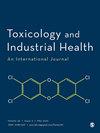抗坏血酸可减轻汽油引起的大鼠睾丸毒性、精子质量下降和睾酮失衡
IF 1.7
4区 医学
Q3 PUBLIC, ENVIRONMENTAL & OCCUPATIONAL HEALTH
引用次数: 0
摘要
本研究评估了抗坏血酸(ASCB)对汽油烟雾(PET)诱导的 Wistar 大鼠睾丸氧化应激、精子毒性和睾酮失衡的保护作用。将 24 只雄性白化大鼠(75 ± 16 克)随机分为三个实验组(N = 8)。对照组:接受普通生理盐水;PET 组:每天在暴露室中吸入 PET 6 小时;PET + 200 毫克 ASCB/kg 体重组:每天吸入 PET 6 小时,同时每只大鼠服用 ASCB。ASCB治疗和PET暴露每周分别进行三次和五次,为期10周。ASCB 联合治疗可防止 PET 诱导的氧化应激指标(谷胱甘肽、谷胱甘肽 S-转移酶、超氧化物歧化酶、过氧化氢生成、一氧化氮和脂质过氧化)和血清睾酮浓度的增加 ( p < .05)。PET 暴露大鼠的精子质量较低,头部和尾部受损的精子数量与组织学损伤同时增加,而服用 ASCB 可将这些损伤降至最低。ASCB 对 PET 诱导的大鼠氧化应激、精子和睾丸损伤有保护作用。本文章由计算机程序翻译,如有差异,请以英文原文为准。
Ascorbic acid attenuates gasoline-induced testicular toxicity, sperm quality deterioration, and testosterone imbalance in rats
The present study evaluated the protective effect of ascorbic acid (ASCB) against gasoline fumes (PET) induced testicular oxidative stress, sperm toxicity, and testosterone imbalance in Wistar rats. Twenty-four (24) male albino rats (75 ± 16 g) were randomized into three experimental groups ( N = 8). The control group: received normal saline, PET group: exposed to PET 6 h daily by inhalation in an exposure chamber and PET + 200 mg ASCB/kg body weight group: exposed to PET 6 h daily by inhalation and administered ASCB per os. Treatment of ASCB and PET exposure was done thrice and five times weekly for a period of 10 weeks respectively. ASCB co-treatment prevented PET-induced increases in the oxidative stress markers (glutathione, glutathione S-transferase, superoxide dismutase, catalase, hydrogen peroxide generation, nitric oxide, and lipid peroxidation) and serum testosterone concentration ( p < .05). Sperm quality was low and those with damaged heads and tails increased alongside histological injuries in the PET-exposed rats, which were also minimized with ASCB administration. ASCB protected against PET-induced oxidative stress, sperm, and testis damage in rats.
求助全文
通过发布文献求助,成功后即可免费获取论文全文。
去求助
来源期刊
CiteScore
3.50
自引率
5.30%
发文量
72
审稿时长
4 months
期刊介绍:
Toxicology & Industrial Health is a journal dedicated to reporting results of basic and applied toxicological research with direct application to industrial/occupational health. Such research includes the fields of genetic and cellular toxicology and risk assessment associated with hazardous wastes and groundwater.

 求助内容:
求助内容: 应助结果提醒方式:
应助结果提醒方式:


